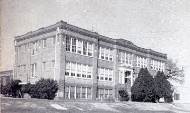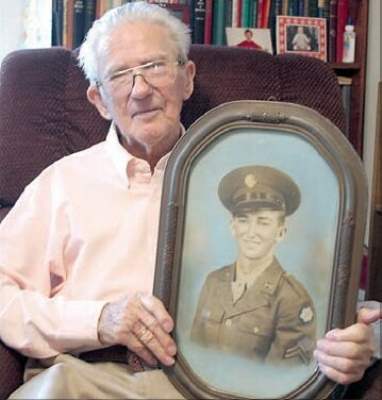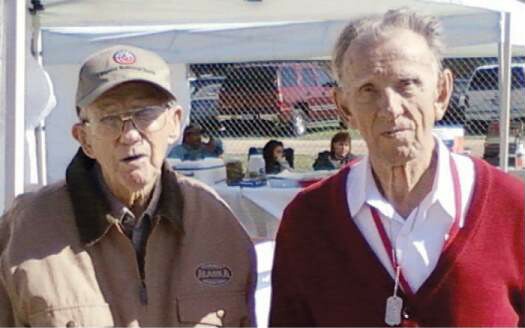Milam County Historical Commission
Milam County, Texas
Milam County, Texas






Ach!, The Memories of Stalag Hearne
Rockdale veteran guarded ‘good, and bad’ Germans at POW camp
By Mike Brown - Reporter Editor
Rockdale Reporter - November 15, 2012
Probably no Rockdale veteran had more direct contact with German soldiers during World
War II than J. D. Wardlow.
About 4,700 of them. And he did it all within 30 miles of Rockdale.
Wardlow was a guard at Camp Hearne, a 1942-46 prisoner of war camp that has now been
restored and stages living history presentations, plus commemorative days.
Wardlow, now 90, attended the third annual Camp Hearne tribute day last month and
greeted a former prisoner, Heino Ehricsen, who settled in The Woodlands, near Houston.
Wardlow, father of longtime Rockdale DPS State Trooper Don Wardlow, now retired,
doesn’t remember Ehricsen. But he sure remembers one of Ehricsen’s barracks mates. Hugo
Krauss was a POW who was brutally murdered and mutilated by Nazi sympathizers for
cooperating with their American captors.
TWO KINDS - Wardlow is a native of Tennessee and went into the Army while he was living
in Illinois. After receiving MP training he was sent to Camp Hearne.
“I’d always wanted to come to Texas,” Wardlow said. “I’d heard my family talk about
it.”
Camp Hearne probably wasn’t what he had in mind.
“We got the second bunch of German POWs,” he said. “Rommel’s Afrika Korps. Straight
from the battlefield, still wearing their filthy, blood-soaked uniforms. They were a
mess.”
Guards found out pretty quickly they had two kinds of prisoners on their hands, the
“Nazis” and the “Democrats.”
“Democrats is what they called themselves to let us know they didn’t agree with Hitler
and the Nazis,” Wardlow said.
The guards pretty quickly exchanged those terms for something more blunt and to the
point—“Good Germans” and “Bad Germans.”
The Bad Germans were committed Nazis, those who bought into Adolf Hitler’s philosophy
and tactics.
“We had to keep them separate,” Wardlow recalled. “Man, the Nazis were mean. They were
always breaking into the other part of the camp and attacking the Good Germans.”
Preferred weapons were “homemade” sticks and clubs, often spiked with nails to do
maximum damage.
The Army gave up on housing Bad Germans at the camp and shipped them to other
locations. That happened after the infamous Hugo Krauss incident.
DUAL CITIZEN - Every Camp Hearne veteran remembers Krauss.
“He was living in New York when the war broke out and he had dual American-German
citizenship,” Wardlow said. “He had a lot of property in Germany and he went back over
there to take care of it.”
“Well, they wouldn’t let him come back to America,” he said. “They put him in the
German army. He got captured and was sent to Camp Hearne.”
Wardlow said it looked like Hugo got along well with everyone at the camp. “But he was
informing on the Bad Germans and their activities. Telling us about escape plans,
things like that.”
It came to a horrific end. “The Bad Germans got him one night, tortured him, killed
him, mutilated his body, Wardlow said. “They cut out his tongue, sharpened his fingers
just like you’d put them in a pencil sharpener. I don’t know how they even did it.”
The Nazi sympathizers said they killed Krauss because of his “failure to honor the
Reich.”
NO HOME - Wardlow, like many of the guards, had a certain amount of sympathy for the
Good German prisoners.
“They were in an impossible situation back home,” he said. “If they didn’t go into the
Army they went right to a firing squad and that’s the truth.”
That situation made guarding them fairly easy.
“They didn’t want to go home,” Wardlow recalled. “They couldn’t go home. They would
either be shot or go right back to the front to give their lives for a cause they
didn’t believe in.”
But the Good Germans were still proud men.
“The only trouble we had was over the way we guarded them,” Wardlow said. “We were
supposed to have one shell in the chambers of our guns and the rest of the shells in
the magazines. They hated that.”
“We sort of compromised, just started out with shells in the magazines, none in the
chambers,” he said. “That was better, but they still didn’t like it,”
“I think most of the time, after the Nazis left, we just guarded them with billy
clubs,” he said.
‘ESCAPES’ - Everyone always asks about escapes. Wardlow said while the Bad Germans
plotted escapes the Good Germans had a much different view of their captivity.
“We’d work them in the fields and the truth was, if they wanted to get away from us,
they could slip into the woods and it was pretty hard to track them down in there,” he
said.
But then where would they go? Wardlow smiled. “When this happened, we’d go into Hearne
and there they would be, sitting in a restaurant drinking coffee. They’d come back with
us.”
“Besides,” he laughed. “I think they ate better than we (the guards) did. They were
always kidding us about that.”
‘DEAR JOHN’ - Don’t get the idea Camp Hearne was a summer camp-out. It was still war.
“We saw one prisoner commit suicide,” Wardlow said. “His girl, back in Germany, had
written him a ‘Dear John’ letter, dumping him. He knew a train came by about the same
time every afternoon. He ran away from us and laid down on the tracks. It was pretty
bad.”
Wardlow remembered “two or three” times when guards shot escaping prisoners.
“We had orders to call out ‘halt’ three times and then shoot them in the leg if they
didn’t stop,” he said.
It was war. What happened on the rare times a guard did shoot a prisoner?
Life was cheap.
“He was court martialed, given one dollar and transferred,” Wardlow said.
THE BASICS - Wardlow was eventually assigned to Fort Hood, got married, settled in Bell
County. He’s now been a resident of Rockdale for nine years.
Ironically his son, Don, patrolled the roads of the county next to Camp Hearne’s for
decades.
“Every once in a while I’d drive by the site over the years but there was nothing there
until this restoration,” J. D. Wardlow said. “Remember, it wasn’t built to last past
the war and it sure didn’t.”
His guarding experience taught him a lot, not the least of which is how the basics of
human nature are the same anyplace, even under extraordinary circumstances.
When Wardlow’s squadron of guards met the first train of POWs at the Hearne station,
the guards’ commanding officer, a captain, was apparently cut from the mold of MASH’s
Major Frank Burns.
“He just strutted, he didn’t really walk,” Wardlow said. “He really thought a lot of
himself and he liked the power he had.”
The prisoners got off the train and stood at attention.
The strutting “comic-opera” captain started with the most basic question “does anyone
here speak English?”
“Well, you know, a lot of them spoke just as good English as we did, but they took an
immediate dislike to our captain and wouldn’t answer him,” Wardlow laughed.
“He kept asking it, almost pleading, then he decided to get tough and told them they
were going to form two columns, march, double-time, the three miles to the camp, not to
look around, and that we had sharpshooters hidden in the woods in case they tried to
get away or didn’t obey. And we did!”
“After about 10 minutes one of the prisoners stepped out, said ‘I speak English’ as
good as I could have, and the whole bunch turned, formed two absolutely straight
columns and literally ran, in perfect step, the three miles to the camp, never once
turning their heads,” he said.
But it wasn’t fear of the captain.
“They knew there was water at the camp and they’d get to take their first showers in
about three weeks,”Wardlow recalled.
“In a couple of hours they had those terrible, bloody stinking clothes washed clean and
hanging all over the fences.”
All credit for this article goes to
Mike Brown and
The Rockdale Reporter

J. D. Wardlow, now 90, holds a
portrait of himself as a 21-year
old, about the time he guarded
German POWs at Camp Hearne.
Photos by Mike Brown
J. D. Wardlow of Rockdale (L)
helped guard 4,700 German
prisoners of war, including
probably Heino Ehricsen of The
Woodlands, at Camp Hearne in
1944-45. They met at the camp
last month.
.
